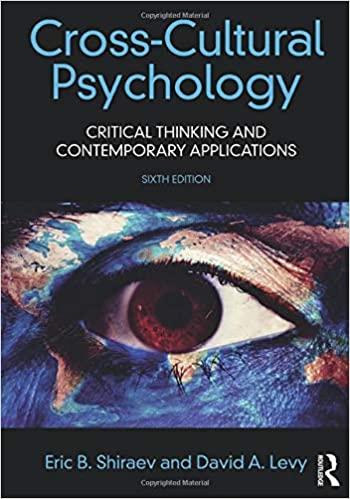Question
Please give an original response (do not copy and paste) to the post below. At least 200 word response, using at least 1 scholarly citation
Please give an original response (do not copy and paste) to the post below. At least 200 word response, using at least 1 scholarly citation that is within the last 5 years. Websites ae NOT preferred sources. List reference/references used.
Addiction is an intricate and widespread concern that impacts individuals on diverse dimensions, and tackling it necessitates a subtle grasp of hesitancy. Motivational Interview (MI) is a curative method that acknowledges hesitancy as an inherent aspect of the transformational process. In the instance of Marci's exploration, her expedition through dependency mirrors the interaction of "sustain talk" and "change talk," exposing the opposing forces within her.
Marci shows "Change Talk" by desiring to be free from addictive conduct. Therefore, she would agree that drunkenness is unhealthy as it affects the relations she maintains (Villarosa-Hurlocker et al., 2019). The circumstance is a pivotal aspect of ambivalence, indicating that an individual desires the positive outcomes associated with relinquishing the practice and becoming accustomed to it.
On the other hand, "sustain talk" comes from Marci's ability to rationalize, validate, and disagree with personality traits or characteristics of her dependency on different aspects. Such containment efforts may include managing harm related to substance use and perceiving temporary relief for psychosocial distress and pain (Hart & Ksir, 2022). The notion of sustenance talk intends to continue speaking of topics without any changes.
This ambivalence might be attributed to conflicting values and anxiety about the way forward once rehabilitation is done. Addiction can be caused by biological, psychological, or society-related factors of addiction genesis (Hart & Ksir, 2022). It is essential to understand the origin of this ambivalence concerning Marci's specific difficulties when designing appropriate interventions.
The OARS (Open-ended questions, affirmations, reflective listening, and summarizing) framework handles Marci's case. For example, an open-ended question will provide her thoughts on using and non-using drugs. For example, such affirmations may congratulate her, for it has taken some courage and effort to fight this. Respond to her empathetically by showing some understanding of what she feels and says (Miller & Rollnick, 2013). Shortening allows for a comprehensive reiteration of the talk and emphasizes essential elements for more exploration.
Marci can be motivated and induced toward self-change, which would resolve her ambivalence. The therapist can use these elements to help her identify that her behavior contradicts her aspirations and values in life (Miller & Rollnick, 2013). A gentler approach affirms Marci's understanding of what she wants to live a happier and healthier life.
Based on scriptural insinuations, such as "For I am capable of accomplishing all things through Christ, who endows me with strength" (Philippians 4:13) and "Hence, if someone is united with Christ, a novel creation has materialized: The former has dissipated, the innovative is present!" (2 Corinthians 5:17, NIV), the therapist can incorporate spiritual facets into the provoking procedure. These allusions underscore the transformative influence of faith and the potential for a revitalized, addiction-free existence through divine empowerment.
In general, the case of Marci's addiction is an ambivalent picture involving both change talks and sustain talks. Therapists can guide people like Marci to overcome ambivalence using MI's OARS framework and the evoking process. In addition, including Scriptural wisdom also enhances therapy, offering a more comprehensive perspective towards healing and transformation.
References
Hart, C. & Ksir, C. (2022). Drugs, society, and human behavior (18th ed.). New York, NY: McGraw-Hill. ISBN: 9781259913860.
Miller, W. R. & Rollnick, S. (2013). Motivational interviewing: Helping people change (3rd ed.). New York, NY: Guilford Press. ISBN: 9781609182274.
Villarosa-Hurlocker, M. C., O'Sickey, A. J., Houck, J. M., & Moyers, T. B. (2019). Examining the influence of active ingredients of motivational interviewing on client change talk.Journal of Substance Abuse Treatment,96, 39-45. https://www.ncbi.nlm.nih.gov/pmc/articles/PMC6260935/
Step by Step Solution
There are 3 Steps involved in it
Step: 1

Get Instant Access to Expert-Tailored Solutions
See step-by-step solutions with expert insights and AI powered tools for academic success
Step: 2

Step: 3

Ace Your Homework with AI
Get the answers you need in no time with our AI-driven, step-by-step assistance
Get Started


